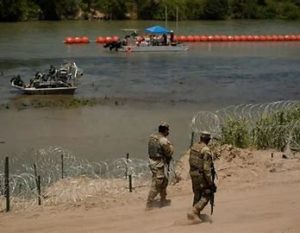In a significant blow to one of Texas Governor Greg Abbott’s staunch measures aimed at curbing illegal migration, the 5th U.S. Circuit Court of Appeals ruled on Friday that Texas must relocate a controversial floating barrier on the Rio Grande, which had sparked tensions with Mexico.

The court’s decision mandates Texas to cease any work on the approximately 1,000-foot floating barrier and relocate it to the riverbank. This ruling aligns with a September decision from a lower court, a decision that Governor Abbott had anticipated would be overturned. Surprisingly, the New Orleans-based court dealt Texas its second legal setback of the week regarding border operations. On Wednesday, a federal judge permitted U.S. Border Patrol agents to continue cutting the razor wire installed by the state along the riverbank, despite objections from Texas officials.
For months, Texas had asserted that certain sections of the Rio Grande were not subject to federal laws protecting navigable waters. However, the appellate judges upheld the lower court’s decision, siding with the Biden administration. Judge Dana Douglas, in the opinion, noted that the lower court had appropriately considered the potential threats to navigation, federal government operations on the Rio Grande, and human life posed by the floating barrier.
Governor Abbott denounced the decision on social media, labeling it “clearly wrong” and affirming the state’s intention to seek a rehearing from the court. He declared, “We’ll go to SCOTUS if needed to protect Texas from Biden’s open borders.”
The legal dispute emerged after the Biden administration sued Abbott over the linked and anchored buoys, which span roughly three soccer fields, installed by the state along the international border with Mexico. These buoys are situated between the Texas border city of Eagle Pass and Piedras Negras, Coahuila, where thousands of individuals were illegally crossing into the U.S. at the time of the barrier installation.
The Biden administration’s lawsuit invoked the Rivers and Harbors Act, a law safeguarding navigable waters. In a dissenting opinion, Judge Don Willet contended that the order to move the barriers falls short of resolving the escalating tensions between the U.S. and Mexican governments, suggesting that complete removal would be necessary.
Approximately 400,000 people attempted to enter the U.S. through the Eagle Pass section of the southwest border in the last fiscal year. U.S. District Judge David Ezra, in the lower court’s decision, had cast skepticism on Texas’ justification for the barrier, questioning the state’s failure to produce credible evidence of its impact on reducing illegal immigration.

